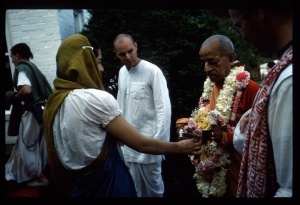SB 7.14.12

A.C. Bhaktivedanta Swami Prabhupada
TEXT 12
- jahyād yad-arthe svān prāṇān
- hanyād vā pitaraṁ gurum
- tasyāṁ svatvaṁ striyāṁ jahyād
- yas tena hy ajito jitaḥ
SYNONYMS
jahyāt—one may give up; yat-arthe—for whom; svān—one's own; prāṇān—life; hanyāt—one may kill; vā—or; pitaram—the father; gurum—the teacher or spiritual master; tasyām—unto her; svatvam—ownership; striyām—unto the wife; jahyāt—one must give up; yaḥ—one who (the Supreme Personality of Godhead); tena—by him; hi—indeed; ajitaḥ—cannot be conquered; jitaḥ—conquered.
TRANSLATION
One so seriously considers one's wife to be his own that he sometimes kills himself for her or kills others, including even his parents or his spiritual master or teacher. Therefore if one can give up his attachment to such a wife, he conquers the Supreme Personality of Godhead, who is never conquered by anyone.
PURPORT
Every husband is too much attached to his wife. Therefore, to give up one's connection with his wife is extremely difficult, but if one can somehow or other give it up for the service of the Supreme Personality of Godhead, then the Lord Himself, although not able to be conquered by anyone, comes very much under the control of the devotee. And if the Lord is pleased with a devotee, what is there that is unobtainable? Why should one not give up his affection for his wife and children and take shelter of the Supreme Personality of Godhead? Where is the loss of anything material? Householder life means attachment for one's wife, whereas sannyāsa means detachment from one's wife and attachment to Kṛṣṇa.